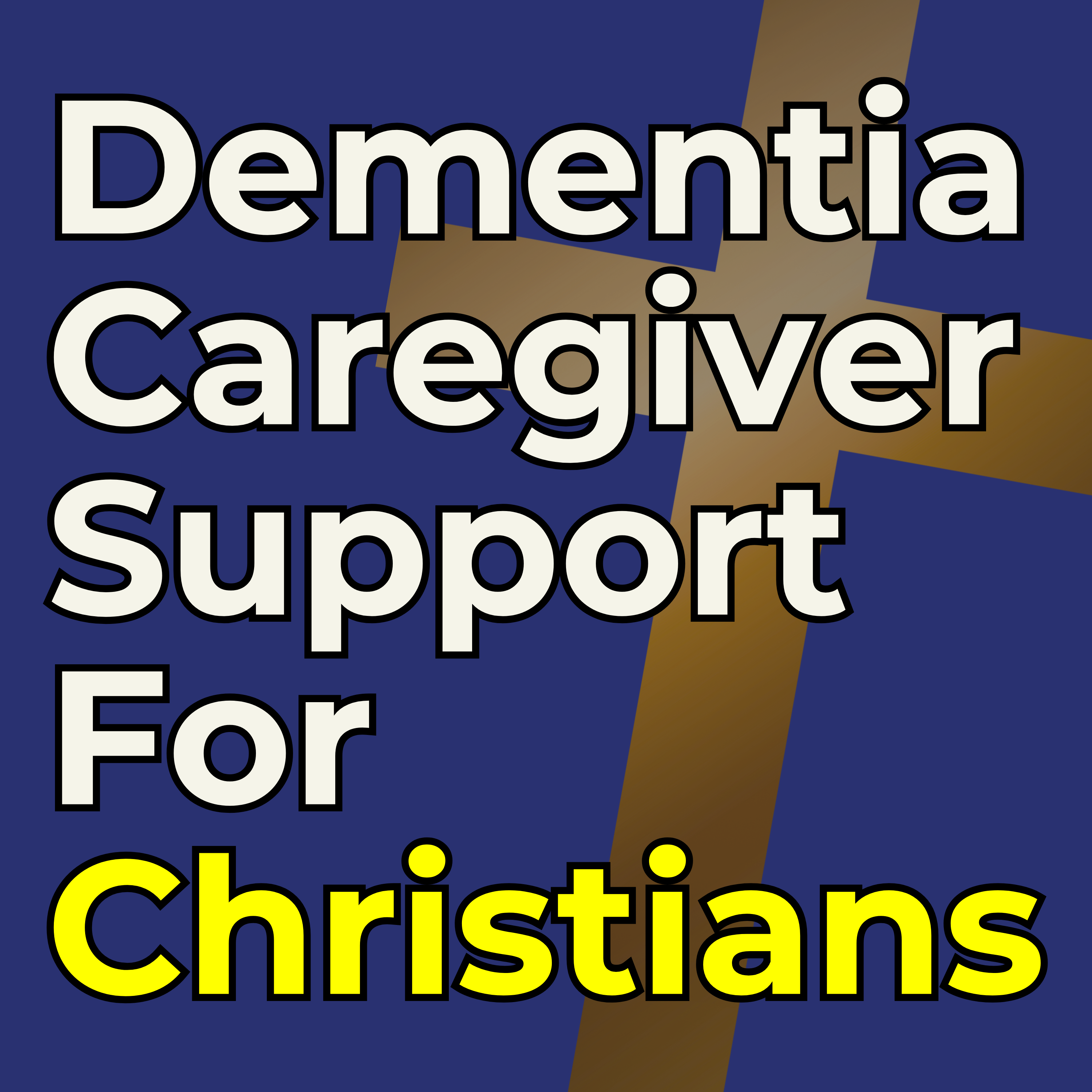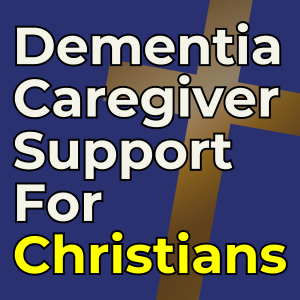

23.6K
Downloads
209
Episodes
Are You a Christian Caregiver Overwhelmed by Dementia or Alzheimer’s? Find Faith-Based Support and Real Solutions. Dementia caregiving is overwhelming, exhausting, and emotionally draining—but you don’t have to figure it out alone. If you’re struggling with caregiver stress, burnout, difficult dementia behaviors, family conflict, or making major care decisions, this podcast equips you with practical, faith-driven strategies to make dementia care easier, less stressful, and more peaceful. This podcast is for Christian spouses, adult children, and family caregivers looking for real answers to their biggest caregiving challenges. Whether you’re dealing with aggression, sundowning, resistance to care, or navigating end-of-life decisions, you’ll gain clear solutions, expert insights, and the support you need to approach caregiving with confidence. Answering Your Most Pressing Dementia Caregiving Questions: ✅ How can I survive dementia caregiving without burnout? ✅ What does dementia caregiving look like from a Christian perspective? ✅ How do I handle aggressive dementia behaviors like hitting, yelling, or refusing care? ✅ What causes sundowning, and how do I stop it? ✅ When is it time for a memory care home? How do I make the right decision? ✅ How can I help my loved one who refuses care? ✅ Why do people with dementia repeat themselves, and how do I stay patient? ✅ How do I know if I’m making the right caregiving decisions? ✅ What are the stages of Alzheimer’s disease, and how can I prepare? ✅ How can I balance self-care and caregiving without guilt? Why Christian Dementia Caregiving is Different Unlike general dementia caregiving podcasts, this show integrates Biblical wisdom into every conversation, helping you find strength and peace even in the hardest seasons. If you’ve ever asked, “Where is God in this?”, you’ll find practical, faith-based guidance to navigate the emotional, physical, and spiritual challenges of caregiving. This podcast will help you: ✔️ Find peace and purpose in your caregiving journey ✔️ Cope with stress and burnout using faith-driven techniques ✔️ Prepare for every stage of dementia with confidence ✔️ Make tough caregiving decisions with clarity and spiritual wisdom Join Our Caregiver Community Caregiving doesn’t have to be lonely. Join our free caregiver community, get access to workshops, and find the encouragement you need to make dementia caregiving easier and more sustainable. 🔹 Subscribe & Listen Now for weekly episodes with insights, strategies, and real solutions to make dementia caregiving less stressful. 🔹 Get Free Caregiver Resources & Support: ThinkDifferentDementia.com 📧 Email: lizette@thinkdifferentdementia.com 🙏 May the Lord bless and keep you, and see you in the next episode.
Episodes

Monday Nov 20, 2023
58. How to Manage Dementia Caregiver Guilt and the Holidays
Monday Nov 20, 2023
Monday Nov 20, 2023
Today on our program, we're diving into a topic that I haven't delved into much before: caregiver guilt during the holidays. To understand this concept better, I did some research, and here's what I found.
Guilt is typically associated with legal contexts, where one is either guilty or not guilty of a crime. As caregivers, we often experience misplaced guilt, feeling like we're not doing enough when we truly are. This guilt can stem from societal expectations or our own perceived shortcomings.
In this podcast episode:
0:01:14 Understanding Caregiver Guilt and its Effects
0:03:27 Strategies for Managing Caregiver Guilt
0:06:59 Acknowledging and managing caregiver guilt
0:09:39 Reframing negative thoughts and focusing on self-care
0:11:08 Creating space for self-care and making the best decisions
0:15:23 Strategies for Dementia Caregiving during the Holidays
0:16:08 Overcoming Caregiver Guilt during the Holidays
0:17:02 Prioritizing and Enjoying the Holidays as a Caregiver
Additionally, caregivers may feel guilty for taking time for themselves or prioritizing their own needs. However, it's important to remember that we can't pour from an empty cup and that self-care is crucial for our well-being.
November is National Family Caregiver Month, highlighting the rights caregivers have to take care of themselves. It's natural for caregivers to occasionally lose patience or feel frustrated, but we must be gracious and understanding toward ourselves.
Making unpopular decisions is another source of guilt for caregivers, such as taking away a loved one's car or considering assisted living. Balancing caregiving with other responsibilities, like work or marriage, can also evoke guilt.
While it's essential to acknowledge our feelings of guilt, we must challenge the notion that we've done something wrong. Our emotions are valid, but they don't always align with reality. Negative thoughts can spiral, leading to a sense of overwhelm and a belief that things will never improve.
Therefore, it's crucial to be mindful of our thoughts and not dwell in a space of guilt. By reframing our mindset, we can navigate the challenges of caregiving with resilience and hope.
Caregiver guilt is a common experience, with feelings of not doing enough and taking time for oneself causing guilt. Managing emotions and making decisions different from what others prefer can also lead to guilt.
However, I encourage a shift in perspective during the holidays. I suggest taking a moment to list all the things done for our loved one, realizing that we are indeed doing enough. Misplaced expectations from both sides can contribute to guilt, but focusing on self-care is essential.
I emphasize the analogy of putting on your oxygen mask before helping others, highlighting the importance of respite care and seeking support. I emphasize reframing frustrations and understanding that loved ones cannot control their circumstances.
Making decisions with the best available information is crucial, even if they may not be popular. Balancing responsibilities can be achieved by putting structures in place ahead of time.
During the holidays, I suggest smaller gatherings and creating space without guilt. I stress that as long as the person needing care is taken care of, it is okay to prioritize spending time with our own family. Saying no to overwhelming demands is okay, and prioritizing the well-being of loved ones is key.
I acknowledge my own misplaced guilt and provide strategies to navigate caregiver guilt during the holiday season.
Enjoy our podcast? Please take a moment to leave us a review on Apple Podcasts—it really supports our show!
https://podcasts.apple.com/us/podcast/dementia-caregiving-for-families/id1716187550
Book a Call with Lizette
https://www.dementiacaregivingmadeeasy.com/book-a-call-meeting-with-lizette
Are you helping someone you love with dementia?
The First Thing You Need To Know Is... You Are Not Alone!
Join our FREE workshop here: https://www.dementiacaregivingmadeeasy.com/wsl
Join our Facebook Group at: https://www.facebook.com/groups/1301886810018410
No comments yet. Be the first to say something!